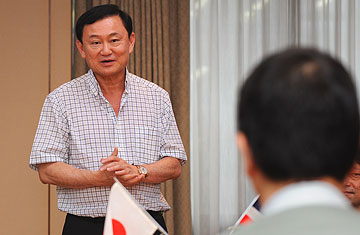
Thailand's fugitive former Prime Minister Thaksin Shinawatra, left, meets with Yoshihiro Murai, governor of Japan's Miyagi prefecture, in Sendai on Aug. 25, 2011
Is Thaksin Shinawatra a criminal or a VIP? The question must have vexed the Japanese officials who considered a request by the former Thai Prime Minister to start a six-day tour of their country this week. Thaksin was ousted in a 2006 military coup, then sentenced in absentia to two years in jail for corruption. Previous attempts by the Dubai-based billionaire to visit Japan and other major nations have been stymied by a hostile Thai government. Stripped of his Thai passport, he travels the world as a citizen of Montenegro.
But Thailand's government has changed — Thaksin's younger sister Yingluck, 44, recently became the nation's first female Prime Minister — and so has the status of its best-known fugitive. He arrived in Tokyo on Aug. 22 to be greeted by Japan's Financial Services Minister Shozaburo Jimi. "Coming to Japan is my own right," he told reporters. "My sister has nothing to do with it."
Well, maybe not his sister. The opposition Democrat Party alleged that Thaksin got his Japanese visa with the help of another relative, this time a distant one, called Surapong Towichukchaikul. He happens to be Thailand's Foreign Minister. Surapong denied the allegation, but it left many Thais wondering about their new Prime Minister's priorities and judgment.
Thailand faces a number of pressing issues, including catastrophic floods and rising costs of living. But the visa scandal suggested Yingluck's first order of business was rehabilitating her controversial brother. A Bangkok Post editorial saw it as evidence of the government's "troubling and divisive favoritism" toward the man whose money and tactics helped elect it.
For Yingluck, an experienced businesswoman but a political novice, Thaksin's timing was awful. He arrived in Japan on the eve of the first parliamentary debate on her government's populist policies. In theory, these include sharply raising the minimum wage, giving tablet computers to primary schoolchildren and establishing the truth about last year's political violence — which killed at least 90 people — between pro-Thaksin Red Shirt protesters and the military.
But as Yingluck plodded through a 44-page policy statement in parliament, Thaksin stole the limelight from Tokyo, by embarking on what resembled a ministerial tour. He spoke favorably of Yingluck's government at a lunch with foreign correspondents, urged Japanese investors to keep faith in Thailand, and prepared to tour areas of Fukushima prefecture devastated by the Mar. 11 earthquake and tsunami.
